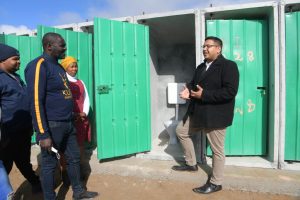Cape Town City has made an unprecedented R9.4bn investment in infrastructure for the 2023/24 financial year, with 94% of the budget already disbursed or contractually designated. The investment aims to enhance water security, energy security, and public transport, while also creating thousands of affordable housing opportunities and safer communities. The construction industry alone is set to generate approximately 130,000 jobs, making a substantial impact on the city’s employment surge. Mayor HillLewis has appealed for additional funding from the National Treasury to further advance the city’s ambitious infrastructure upgrade plans.
Cape Town’s council has allocated a massive R39.5 billion for initiatives that directly benefit lowincome households, with a focus on affordable housing and environmental resilience. This forwardthinking infrastructure plan is double that of Durban’s and 80% larger than Johannesburg’s. The city is also celebrating its sports stars while marking new milestones in infrastructure investment, with a dedication to transparency, efficiency, and commitment to growth. The Mayor and Council have set ambitious goals, and Cape Town eagerly anticipates witnessing the fruition of these plans.
Cape Town’s economic progress is on the rise, with Moody’s Investor Services upgrading the city’s credit rating outlook from stable to positive. The city plans to invest R39.5 billion in infrastructure over the next three years, with 75% of that budget going directly to lowincome families. This investment is predicted to create nearly 130,000 constructionrelated jobs, building on Cape Town’s reputation for having the lowest unemployment rate in South Africa. The city also plans to invest R120 billion in infrastructure over the next ten years and is committed to tackling socioeconomic disparities.
Cape Town’s Comprehensive Infrastructure Development Plan is a groundbreaking initiative that will transform the city with a massive investment of R39.5 billion towards infrastructure development. The project is estimated to generate 130,000 constructionrelated jobs over three years, benefitting lowerincome households and rectifying socioeconomic disparities. Cape Town’s innovative funding approach blends financing from its balance sheet and local and international markets, positioning the city at the forefront of urban development initiatives in South Africa.
Cape Town: A Symbol of Hope with Unprecedented Infrastructure Investment for Alleviating Poverty
Cape Town has proposed a R39.5 billion infrastructure investment blueprint, known as the Building for Jobs Budget, over three years to alleviate poverty and become Africa’s most businessfriendly city. The budget includes plans for diverse projects, including upgrading informal settlements, providing lowincome households with the highest free water allocation, and offering the widest qualifying criteria for a 100% rates rebate. The budget is a testament to the city’s commitment to democracy, with extensive comments and feedback from Capetonians contributing to its formation. The Building for Jobs Budget serves as a symbol of hope, reflecting the city’s determination to create a prosperous future for all.
Cape Town’s Building for Jobs Budget is a groundbreaking initiative that focuses on propoor infrastructure investment, committing R39.5bn to underserved sectors over the next three years. The budget prioritizes communitycentric development, with 75% of the proposed R12bn investment benefiting lowerincome households. The initiative aims to generate 130,000 constructionrelated jobs and reshape Cape Town’s narrative, striving to dismantle the unjust past and plot a path towards a more balanced future. Through this budget, Cape Town aspires to become a City of Hope, adhering to its longterm vision.
Cape Town’s Bold Infrastructure Initiative: A New Era for South Africa’s Vibrant Metropolis
Cape Town has announced a massive R120 billion infrastructure project pipeline that includes investments of R43 billion over the next three years. The investment plans are expected to create 135,000 jobs and uplift lowincome households and those residing in informal settlements. The city is committed to sustainability and inclusivity, with significant investments in water and sanitation, transportation, waste management, and affordable housing. Cape Town’s infrastructure investments herald a new era of prosperity for the city’s inhabitants and solidify its status as a hub of national economic growth.
Cape Town, a bustling city in South Africa, has experienced a recent surge in economic growth that has led to the creation of 263,000 new jobs in the past year. According to a quarterly labor survey by StatsSA, 56,000 of those jobs were added in the most recent quarter alone, resulting in a 7% yearonyear decrease in the city’s unemployment rate.
The electrification project in Gugulethu’s Khikhi and NY61 areas is a significant milestone for the community. The initiative has connected 571 households to the electricity grid, transforming the living conditions of the residents and improving their safety by eliminating the need for open flames.
Deputy President Paul Mashatile recently delivered a keynote address at the 2023 Batseta Winter Conference, emphasizing the importance of collaboration between the government and the private sector in driving sustainable and inclusive socioeconomic growth in South Africa. ### The Need for Collaboration
Cape Town, a bustling coastal city in South Africa, is committed to investing R4.3 billion in water and sanitation infrastructure in the 2023/2024 financial year. This significant initiative showcases the Water and Sanitation Directorate’s dedication to providing access to highquality water and ensuring that communities do not suffer from sewer overflows. The city’s investment plan also strives to provide adequate sanitation in informal settlements, promoting a healthier environment for all residents.
Cape Town is a city known for its beauty and culture that attracts visitors from around the world. However, the city is not without its challenges. Crime, water scarcity, and power outages are just a few of the issues that Cape Town faces. In this article, we will delve into the vision of Mayor Geordin HillLewis and the strategies being implemented by the City of Cape Town (CoCT) to overcome these obstacles.
Assuming the role of Eskom CEO in January 2020, André de Ruyter soon discovered why it was considered the most challenging job in South Africa. In his newly published book, “Truth to Power: My Three Years Inside Eskom” by Random House Publishers, the former CEO takes readers on a journey through boardrooms and government meetings, unveiling the inner dynamics of the stateowned enterprise.
The South African rand experienced a significant decline last week, reaching a record low against the US dollar. Various factors, including a diplomatic dispute between South Africa and the US, an ongoing electricity crisis, and unfavorable effects on economic growth and public finances, caused this depreciation.
South Africa and Colombia recently celebrated a significant milestone in their longstanding relationship during an official visit by Colombian Vice President Francia Elena Márquez. Deputy President Paul Mashatile of South Africa hosted a media briefing after the meeting, which took place at the Sefako Makgatho Presidential Guesthouse in Pretoria. The two countries are aiming to strengthen their political and economic ties while acknowledging their shared colonial legacies and the vast diversity of people, culture, and ecology in both nations.
South Africa and Singapore enhance economic cooperation On May 16th, 2023, South African President Cyril Ramaphosa received Singapore’s Prime Minister Lee Hsien Loong in an official visit to Cape Town. This meeting aimed to strengthen the existing economic partnership between the two countries and explore new opportunities for collaboration.
















